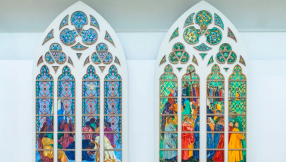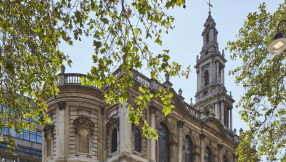
The Archbishop of Canterbury called for a "compassionate" asylum system in the House of Lords on Friday as he warned that the government's Rwanda plan was "a mistake".
During the debate which he initiated, Archbishop Justin Welby said that while it was beyond the capacity of the UK to take in everyone fleeing violence and devastation, the UK should nonetheless "take a lead" on asylum and immigration and create a policy underpinned by "recognition of human dignity".
He argued that a "compassionate" asylum system "does not mean open borders" but combating smugglers and preventing small boats from crossing the Channel while providing "safe and legal ways for people to get here".
Condemning the government's plan to send asylum seekers to Rwanda for processing, the Archbishop said that there was no evidence that this form of deterrence or hostile environment works and that it was feeding "the politics of suspicion and division" when the Homes for Ukraine scheme had demonstrated that refugees can be fully integrated.
"Outsourcing our share creates more opportunities for people smugglers to operate in and around Rwanda. It is not a solution; it is a mistake, and it will be a failure," he said.
"Furthermore, the desire for orderly migration to discourage people from 'skipping the queue' is absurd if there is no legal queue."
The Archbishop blamed the "staggering inefficiencies" of successive governments for keeping many people in the asylum system for years at a time, trapping them "in limbo" at "incredible expense to the taxpayer"
He told peers that it was the Church in the UK and elsewhere that was doing "much of the heavy lifting" of meeting and supporting refugees.
"We know—and I make this absolutely clear and underline it—that Britain can neither resolve these problems by ourselves; nor can or should we take everyone who flees such devastation. It is beyond our capacity," he said.
"But we do need to take a lead: how we shape our policies must look into the faces and listen to the voices.
"A hostile environment is an immoral environment. Each human being has an inherent and immeasurable worth, regardless of their status, wealth, heritage or background."
He went on to say that his fellow peers should "reject the shrill narratives that all who come to us for help should be treated as liars, scroungers or less than fully human".
"A compassionate asylum system is one that sees the faces of those in need and listens to their voices," he said.
"A compassionate system does not mean open borders, but a disposition of generosity and a readiness to welcome those whose need is genuine and where we are able to meet that need.
"It also means compassion and generosity to those communities that will receive refugees, which are often neglected and forgotten."
His speech comes after the former Bishop of Rochester, Michael Nazir-Ali, argued this week in support of the Rwanda plan.
"The case for off-shore processing is strong because of the difficulties in removing people, once they are here," he said in a Policy Exchange report.
Nazir-Ali said that illegal immigration "puts pressure on the state to narrow the scope for legal immigration" and "genuine refugees".
He also claimed that most of the people crossing the Channel in small boats "are not refugees in the conventional sense" because they have come "via at least one safe country" like France or Belgium.
While some may have faced harm in their own countries, "many, however, are younger men whose parents may be helping them to evade conscription in countries like Iran or Syria or they may just be economic migrants."













